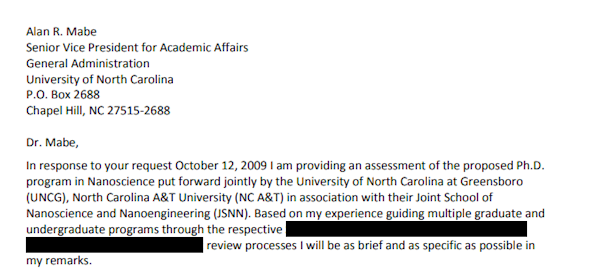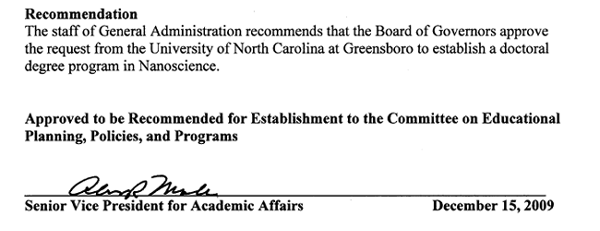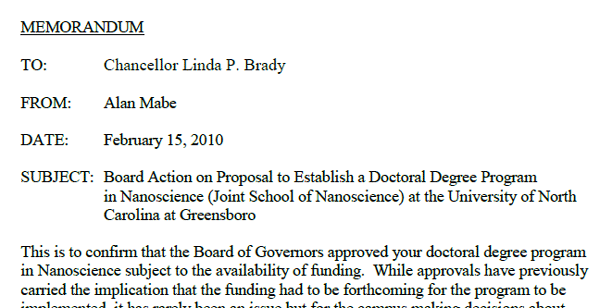| |
|
UNC Board of Governors and
SCAC-COC UNC
Greensboro white privilege Nanoscience degrees at UNCG
affiliate Gateway University Research Park |
|
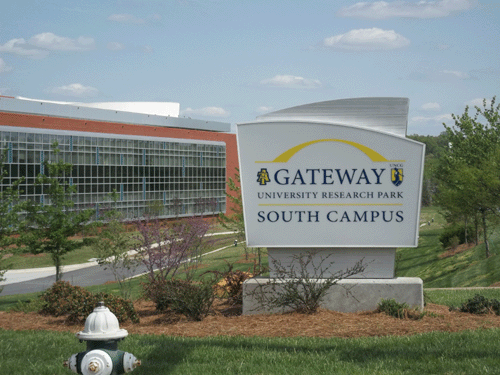 |
| Notwithstanding May
2007 UNC Board of Governors established alleged Joint School
of Nanoscience and Nanoengineering, at bogus NC A&T / UNCG
Joint Millennial Campus, UNCG affiliate, Gateway University
Research Park, Inc. to offer (a) joint interdisciplinary
Ph.D. degree and (a) joint professional science master's
degree. |
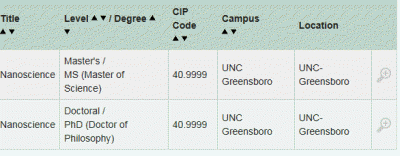 The
University of North Carolina Board of Governors
authorized HWI UNC Greensboro Nanoscience MS on
November 13, 2009 and PhD program in
Nanoscience on January 8, 2010 requiring UNCG
students take relevant courses at the School of
Engineering at North Carolina A&T University and
be able to work on collaborative projects with
faculty in the School of Engineering”. The
University of North Carolina Board of Governors
authorized HWI UNC Greensboro Nanoscience MS on
November 13, 2009 and PhD program in
Nanoscience on January 8, 2010 requiring UNCG
students take relevant courses at the School of
Engineering at North Carolina A&T University and
be able to work on collaborative projects with
faculty in the School of Engineering”. |
|
|
 |
|
Excluding (The) North Carolina Agricultural and Technical
State university from offering MS and PhD Nanoscience
degrees, forcing the HBCU out of the JSNN Mission to offer (a)
joint interdisciplinary Ph.D. degree and (a) joint
professional science master's degree. And depriving NC A&T
benefit Nanoscience funding. |
| |
For Liberal Arts UNC Greensboro with doctorial programs in
music and nursing to offer Nanoscience degrees requires
access to NC A&T academic programs and research: “Although
the degree is in Nanoscience (does not include
Nanoengineering),

students will be given the opportunity to take relevant
courses at the School of Engineering at North Carolina
A&T University and must be able to work on collaborative
projects with faculty in the School of Engineering. |
| |
When all of the occupations which will be
affected by nanotechnology will require a BS in engineering
with a broad, interdisciplinary and multi-disciplinary
approach; will require an understanding not only of
electrical, mechanical and civil engineering, but biology,
physics and chemistry as well.

Why is across-town Liberal Art UNC
Greensboro with programs in music and nursing, requiring
relevant courses be taken at the School of Engineering at
North Carolina A&T University and will be able to work on
collaborative projects with faculty in the School of
Engineering”, except for unvarnished
racism offering Nanotechnology degrees? |
|
| |
| |
|
Fraudulent claiming HBCU NC A&T and HWI
UNCG were partners in NCGS:
116-198.34. (8b) NC
A&T/UNCG Joint
Millennial Campus. May 2007 UNC Board of Governors
established alleged Joint School of Nanoscience and
Nanoengineering, at de
facto NC
A&T / UNCG Joint Millennial Campus, UNCG affiliate,
Gateway University |
|
 |
Research
Park, Inc.; to
offer (a) joint interdisciplinary Ph.D. degree and (a)
joint professional science master's degree.
|
|
The National Center for Educational Statistics (NCES)
responsible for collecting and presenting statistical data
and information for the nation; classifies Nanoscience and
Nanoengineering as Nanotechnology CIP 15.1601: Engineering
technologies and Engineering related fields |
 |
|
PCG/UNC-NCCCS/UNC Interim report
3.doc/RB.SP.PC.CR.ATPCC.1/CC.14/10May05 |
|
|
 |
|
University of North Carolina at Greensboro
2007-2008 Profile |
|
|
| |
| Historical black
North Carolina A&T, as one of the state's two land
grant institutions, has programs through the
doctoral level. Its programs include engineering,
arts and sciences, agricultural and environmental
sciences, business and economics, education,
nursing, technology, and graduates studies. “The
expected roles of a land-grant institution, is
teaching agriculture and engineering, and providing
cooperative extension services” . |
 |
|
For Liberal Arts UNC Greensboro with doctorial programs in music and
nursing to offer Nanoscience degrees requires access to NC A&T
academic programs and research: “Although the degree is in
Nanoscience (does not include Nanoengineering),

students will be given the opportunity to take relevant courses at
the School of Engineering at North Carolina A&T University and
must be able to work on collaborative projects with faculty in the
School of Engineering.
|

An Interdisciplinary Degree program involves two or more academic
units, either on the same or different campuses in a formal
agreement to offer a program of study drawing on two or more
disciplines that will result in a student being awarded an
interdisciplinary degree. If more than one campus is involved in
offering the program it would also be a joint degree. |
| |
|
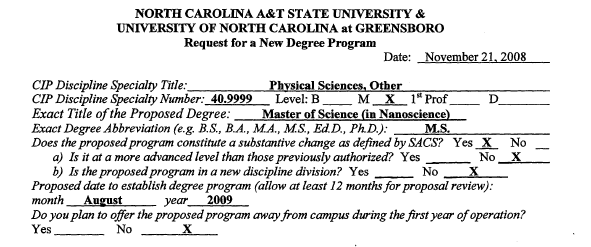 |
|
NCA&T/UNCG submitted Joint
Request for authorization to
Establish” Ph.D. in Nanoscience”
dated Oct. 10, 2008 to UNC
General Administration and Joint
Request for authorization to
establish “Master of Science (in
Nanoscience)” dated Nov. 21,
2008 to UNC General
Administration, and unambiguous
duplication. |
|
|
|
| |
United States v. Fordice, 505 U.S. 717 (1992)
a United States Supreme Court case that resulted in an eight
to one ruling that the eight public universities in
Mississippi had not sufficiently integrated and that the
state must take affirmative action to change this under the
Equal Protection Clause and Title VI. This
is not a legal setting but context comparison UNC BOG & SOCS
policies in light of the selected text held in UNITED STATES
v. FORDICE, GOVERNOR OF MISSISSIPPI :
|
|
..If the State perpetuates policies and practices traceable
to its prior de jure dual system that continue to have
segregative effects ...implicit in the court’s finding of
“unnecessary” duplication is the absence of any educational
justification ....and such policies are without sound
educational justification and can be practicably eliminated,
implicated the Equal Protection clause... , emphasis added. |
|
| |
| Notwithstanding May
2007 UNC Board of Governors established alleged
Joint School of Nanoscience and Nanoengineering, at
bogus NC A&T / UNCG Joint Millennial Campus, UNCG
affiliate, Gateway University Research Park, Inc. to
offer (a) joint interdisciplinary Ph.D. degree and
(a) joint professional science master's degree. |
 The
University of North Carolina Board of
Governors authorized HWI UNC Greensboro
Nanoscience MS on November 13, 2009 and
PhD program in Nanoscience on January 8,
2010 requiring UNCG students take
relevant courses at the School of
Engineering at North Carolina A&T
University and be able to work on
collaborative projects with faculty in
the School of Engineering”. The
University of North Carolina Board of
Governors authorized HWI UNC Greensboro
Nanoscience MS on November 13, 2009 and
PhD program in Nanoscience on January 8,
2010 requiring UNCG students take
relevant courses at the School of
Engineering at North Carolina A&T
University and be able to work on
collaborative projects with faculty in
the School of Engineering”. |
|
|
 |
|
Excluding (The) North Carolina Agricultural and
Technical State university from offering MS and PhD
Nanoscience degrees, forcing the HBCU out of the
JSNN Mission to offer (a)
joint interdisciplinary Ph.D. degree and (a) joint
professional science master's degree. And depriving
NC A&T benefit Nanoscience funding. |
|
| |
|
 |
|
The UNC Policy Manual 400.1.1.1[G] Adopted 05/06/09 |
 |
|
Responding to a Public
records request to Dr. David H. Perrin UNCG
Provost & Executive Vice Chancellor,1/7/11,
for a copy of an UNCG chancellor signed
request to establish stand alone Masters and
PhD Nanoscience degrees at UNCG, Counsel
Steve Serck responded "In
response to your request of 1/7/11, no such
documents as you described exists." |
| |
|
Unambiguous
lack of UNCG Chancellor
Dr. Linda Brady signed Proposals requesting
to establish Nanoscience Professional Master
of Science in Nanoscience and Ph.D.
Nanoscience clearly demonstrated
UNCG Nanoscience degrees had not been
approved by the faculty and administration,
and were not pursuant UNC
Policies 400.1.1,1[G]and 400.1.1.5[G], . |
|
|
| |
| |
 Ask
(then )UNC President Erskine Bowles, Dr. Alan Mabe, Dr.
Alton Thompson, Dr. David H. Perrin, Dr. James Ryan and NC
A&T Chancellor Harold Martin, where are NC A&T Nanoscience
degrees? Ask
(then )UNC President Erskine Bowles, Dr. Alan Mabe, Dr.
Alton Thompson, Dr. David H. Perrin, Dr. James Ryan and NC
A&T Chancellor Harold Martin, where are NC A&T Nanoscience
degrees? |
| |
|
 |
|
A degree program is a
program of study in a discipline specialty
that leads to a degree in that distinct
specialty area at a particular level of
instruction. As a general rule, in order
to be considered for degree program status,
a course of study should require at least 27
semester hours in the proposed program area
at the undergraduate level; at least half
the number of hours required for the degree
at the master’s level; and at least 21
hours in the proposed program area at the
doctoral level. [Adopted
05/06/09] Emphasis added. |
|
| |
Doctor of Philosophy in Nanoscience
The PhD in Nanoscience requires a minimum of 60
hours and is designed to prepare students to take
positions in industrial, governmental, or academic
research settings by providing a solid background in
Nanoscience theory and experimental techniques
through course work and dissertation research. |
| |
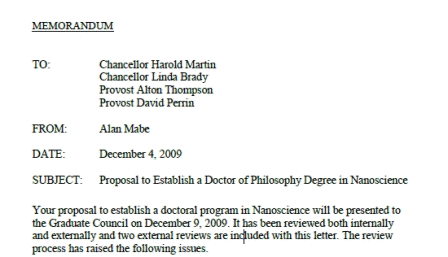 |
Dr. James Sadler Associate Vice
President for Academic Planning
University of North Carolina :
December 9, 2009
UNC Graduate Council recommends
authorization of the joint PhD. |
| |
|
|
|
When all of
the occupations which will be affected
by nanotechnology will require a BS in
engineering with a broad,
interdisciplinary and multi-disciplinary
approach; will require an understanding
not only of electrical, mechanical and
civil engineering, but biology, physics
and chemistry as well.

Why is
across-town Liberal Art UNC Greensboro
with programs in music and nursing,
requiring relevant courses be taken at
the School of Engineering at North
Carolina A&T University and will be able
to work on collaborative projects with
faculty in the School of Engineering”, except
for unvarnished racism offering
Nanotechnology degrees? |
|
|
|
| |
|
See UNC Board of Governors UNC Greensboro white privilege
Nanoscience Degrees |















